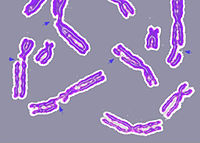
Somatostatin analogues labeled with copper radioisotopes: current status
Sign Up to like & getrecommendations! Published in 2017 at "Journal of Radioanalytical and Nuclear Chemistry"
DOI: 10.1007/s10967-017-5323-x
Abstract: Peptide receptor radionuclide therapy (PRRT) is a promising way to treat patients with inoperable tumors or metastatic neuroendocrine tumors. This therapeutic strategy is using radiolabeled peptides, which are capable of selective biding to receptors overexpressed… read more here.
Keywords: labeled copper; copper radioisotopes; current status; analogues labeled ... See more keywords

Tumour-infiltrating cytotoxic T lymphocytes in somatotroph pituitary neuroendocrine tumours
Sign Up to like & getrecommendations! Published in 2019 at "Endocrine"
DOI: 10.1007/s12020-019-02145-y
Abstract: Introduction Somatotroph pituitary tumours are often resistant to first-generation somatostatin analogues and can invade the surrounding structures, limiting the chances of curative surgery. Recent studies suggested that the immune microenvironment and pro-angiogenic factors can influence… read more here.
Keywords: sinus invasion; somatotroph pituitary; median hpf; somatostatin analogues ... See more keywords

Recurrent Metastatic Medullary Thyroid Carcinoma: A Case of Sustained Response to Prolonged Treatment with Somatostatin Analogues.
Sign Up to like & getrecommendations! Published in 2017 at "Thyroid"
DOI: 10.1089/thy.2016.0540
Abstract: Background: Medullary thyroid carcinoma (MTC) is a rare disease. Treatment options for recurrent disease are limited. Although somatostatin analogues might have a role as anticancer agents in MTC, the evidence is inconclusive. Patient Findings: A… read more here.
Keywords: medullary thyroid; recurrent metastatic; treatment; thyroid carcinoma ... See more keywords

Association between dopamine and somatostatin receptor expression and pharmacological response to somatostatin analogues in acromegaly
Sign Up to like & getrecommendations! Published in 2018 at "Journal of Cellular and Molecular Medicine"
DOI: 10.1111/jcmm.13440
Abstract: Acromegaly is a hormonal disorder resulting from excessive growth hormone (GH) secretion frequently produced by pituitary adenomas and consequent increase in insulin‐like growth factor 1 (IGF‐I). Elevated GH and IGF‐I levels result in a wide… read more here.
Keywords: response ssas; association; expression; somatostatin ... See more keywords

The effects of somatostatin analogues on glycaemia in the treatment of neuroendocrine tumours.
Sign Up to like & getrecommendations! Published in 2021 at "Journal of neuroendocrinology"
DOI: 10.1111/jne.13064
Abstract: Long-acting somatostatin analogues (SSAs) are the most commonly used drugs in the management of neuroendocrine tumours (NETs) because of their ability to control symptoms and prolong survival. SSA use is associated with changes in glucose… read more here.
Keywords: neuroendocrine tumours; somatostatin analogues; treatment; glycaemic control ... See more keywords

A Multicenter Experience with Long-Acting Somatostatin Analogues in Patients with Congenital Hyperinsulinism
Sign Up to like & getrecommendations! Published in 2017 at "Hormone Research in Paediatrics"
DOI: 10.1159/000485184
Abstract: Background/Aims: Congenital hyperinsulinism (CHI) is a rare disease characterized by recurrent severe hypoglycemia. In the diffuse form of CHI, pharmacotherapy is the preferred choice of treatment. Long-acting somatostatin analogues have been used in children as… read more here.
Keywords: long acting; experience long; acting somatostatin; congenital hyperinsulinism ... See more keywords

The palliative management of non-islet cell tumour hypoglycaemia with glucocorticoids and somatostatin analogues in an unresectable hepatocellular carcinoma.
Sign Up to like & getrecommendations! Published in 2022 at "Annals of the Royal College of Surgeons of England"
DOI: 10.1308/rcsann.2021.0269
Abstract: Non-islet cell tumour hypoglycaemia (NICTH) results from paraneoplastic insulin-like growth factor-II (IGF-II) secretion and its potent insulin-like effect. It causes recurrent, often severe, hypoglycaemic episodes, which is detrimental to quality of life. There is limited… read more here.
Keywords: somatostatin analogues; cell tumour; non islet; islet cell ... See more keywords

Association between Biomarkers (VEGF-R2, VEGF-R3, VCAM-1) and Treatment Duration in Patients with Neuroendocrine Tumors Receiving Therapy with First-Generation Somatostatin Analogues
Sign Up to like & getrecommendations! Published in 2023 at "Biomedicines"
DOI: 10.3390/biomedicines11030842
Abstract: Angiogenic factors (AF) promote vascular formation and may thus support neuroendocrine tumour (NET) development. This study aimed to assess AF serum level changes in NET patients treated with prolonged-acting somatostatin analogues (SSAs). The study enrolled… read more here.
Keywords: vegf vcam; vegf vegf; group; somatostatin analogues ... See more keywords

Chronic Treatment with Somatostatin Analogues in Recurrent Type 1 Gastric Neuroendocrine Tumors
Sign Up to like & getrecommendations! Published in 2023 at "Biomedicines"
DOI: 10.3390/biomedicines11030872
Abstract: Background: Type 1 gastric neuroendocrine tumors (GC-1) represent an uncommon subtype of neoplasms. Endoscopic resection has been proposed as the treatment of choice; active surveillance may be performed in those smaller than 1 cm, while… read more here.
Keywords: chronic treatment; gastric neuroendocrine; neuroendocrine tumors; type gastric ... See more keywords

Radiolabeled Somatostatin Analogues for Diagnosis and Treatment of Neuroendocrine Tumors
Sign Up to like & getrecommendations! Published in 2022 at "Cancers"
DOI: 10.3390/cancers14041055
Abstract: Simple Summary Neuroendocrine neoplasms (NENs) are rare and heterogeneous tumors, presenting in often challenging clinical scenarios, and require multidisciplinary discussion for optimal care. The theranostic approach (DOTA peptides labelled with 68Ga for imaging well-differentiated neuroendocrine… read more here.
Keywords: therapy; neuroendocrine tumors; prrt; somatostatin analogues ... See more keywords

Casting a Wider NET: Pancreatic Exocrine Insufficiency Induced by Somatostatin Analogues among Patients with Neuroendocrine Tumours?
Sign Up to like & getrecommendations! Published in 2023 at "Cancers"
DOI: 10.3390/cancers15071933
Abstract: Simple Summary Somatostatin analogues (SSA) are used to treat patients with unresectable neuroendocrine tumours (NET). An underrecognized side-effect of SSAs is pancreatic exocrine insufficiency (PEI), where the pancreas is unable to maintain the normal digestion… read more here.
Keywords: pei; neuroendocrine tumours; exocrine insufficiency; pancreatic exocrine ... See more keywords